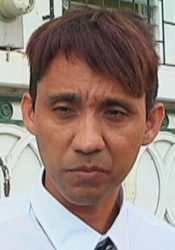Rights advocates around the Caribbean have welcomed the ruling by Chief Justice of Belize Kenneth Benjamin, that Section 53 of the Belize Criminal Code is inconsistent with the Constitution.
The Chief Justice, a Guyanese by birth, decided that Section 53 is inconsistent with the Constitution of Belize because it violates the right to human dignity, privacy, freedom of expression and non-discrimination and equality before the law and equal protection of the law.

The challenge to Section 53 was in the form of a constitutional case brought by Executive Director of the United Belize Advocacy Movement (UNIBAM) Caleb Orozco, who is also a gay man, in July 2010. UNIBAM is a policy and advocacy human rights NGO working to advance the rights protection and enforcement for LGBT persons.
Welcoming the decision, UNAIDS Director of the Latin America and Carib-bean Regional Support Team Dr Cesar Nuñez said it, “echoes the widespread public opinion in Belize that people should be treated with dignity and equality, regardless of who they love.”
Stating that the development comes at a critical juncture in the HIV response, he noted that discriminatory and punitive laws regarding sex between men hamper access to HIV and STI prevention and treatment and other social services by reinforcing discriminatory attitudes. Many people are reluctant to reveal their same sex behaviour due to fear of discrimination, harassment and violence. This ruling removes a key stumbling block to gay, bisexual and other men who have sex with men accessing HIV testing and treatment services.
UNAIDS noted too that through the Sustainable Development Goals the world has committed to end the AIDS epidemic as a public health threat by 2030.
UNAIDS congratulated Orozco, UNIBAM and other supporting civil society organisations, for their courage, leadership and resilience over the last six years.
“We also recognise the initiative of the University of the West Indies Rights Advocacy Project (U-RAP) to promote human rights, equality and social justice in the Caribbean through judicial review. Together civil society and the legal fraternity have taken on the challenging task of regional law reform in pursuit of increased human dignity and human rights in the region.
“Without the solidarity and persistence of these stakeholders this victory for equality would not have been possible,” Dr Nuñez said. “We encourage civil society to continue to mobilize on behalf of those who are most vulnerable and to be the voice of the voiceless.”
UNAIDS advocates for the removal of punitive laws which are detrimental to the AIDS response. The release noted that this must be combined with strategies to increase testing, treatment and treatment retention rates, particularly among young people, sex workers, transgender people, gay, bisexual and other men who have sex with men and other key populations.
Meanwhile, UN Secretary General Special Envoy for HIV in the Caribbean Edward Greene said he was “delighted at this landmark decision… It truly vindicates the tireless efforts of UNIBAM and in particular the advocacy of … Orozco, his legal team and… U-RAP. This is truly a victory for Belize and for human rights.
In a statement issued on Wednesday, Greene said it must give impetus to the Justice for All movement throughout the Caribbean, the struggle to dismantle all forms of stigma and discrimination and the goal of elevating the principles of dignity and respect for all.
Director of PANCAP Coordinating Unit Dereck Springer said he warmly welcomed the decision, “which resulted from the untiring efforts and personal sacrifice of Caleb Orozco. This decision affirms the rights of the LGBTI people to be treated with dignity and respect and is a step in the right direction as we advance the PANCAP Justice for All in the Caribbean.”
In an invited comment Managing Director of the Society Against Sexual Orientation Discrimination (SASOD) Joel Simpson said that the decision has important implications for the cross-dressing case before the Guyana Court of Appeal.
“We have based our suit on some of the very fundamental rights and freedoms that the Caleb Orozco won the ‘Unnatural Crime’ case on: freedom of expression and the right to equality and non-discrimination are two very important ones,” he said. “Guyana’s constitution offers stronger protections in terms of equality rights.”
He noted that in 2003, the Constitution was amended to incorporate seven international human rights treaties. This means citizens can also rely on those treaty obligations and the jurisprudence of treaty bodies as part of their constitution rights.
“In effect, our claim that the law violates freedom of expression and the right to equality and non-discrimination on the basis of gender is therefore a very sound argument,” Simpson stated. “The Belize case was won on all these counts. And similarly, the Guyana Court of Appeal should be significantly persuaded by the reasoning of Belize’s Chief Justice, given our similar constitutions and legal traditions as Commonwealth Caribbean countries.”
In Belize until 1944 only forced or non-consensual carnal intercourse against the order of nature was criminalized.




